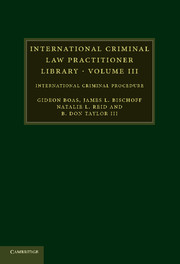Book contents
- Frontmatter
- Contents
- Foreword
- Table of authorities
- Table of short forms
- 1 The nature of international criminal procedure
- 2 Creation and amendment of rules of international criminal procedure
- 3 Procedures related to primacy and complementarity
- 4 Investigations, rights of suspects, and detention
- 5 Defence counsel, amici curiae, and the different forms of representation of accused
- 6 Pre-trial proceedings
- 7 Trial proceedings
- 8 The role and status of victims in international criminal procedure
- 9 Evidence
- 10 Judgement and sentencing
- 11 Appeal and revision
- 12 Conclusion
- Index
- References
11 - Appeal and revision
Published online by Cambridge University Press: 05 August 2011
- Frontmatter
- Contents
- Foreword
- Table of authorities
- Table of short forms
- 1 The nature of international criminal procedure
- 2 Creation and amendment of rules of international criminal procedure
- 3 Procedures related to primacy and complementarity
- 4 Investigations, rights of suspects, and detention
- 5 Defence counsel, amici curiae, and the different forms of representation of accused
- 6 Pre-trial proceedings
- 7 Trial proceedings
- 8 The role and status of victims in international criminal procedure
- 9 Evidence
- 10 Judgement and sentencing
- 11 Appeal and revision
- 12 Conclusion
- Index
- References
Summary
The right to appeal a conviction in international criminal law, ostensibly founded on the jus cogens norm of a right to a fair trial, is embodied in several international instruments, including the statutes of the international criminal tribunals, and today likely forms part of customary international law. The right finds its origins in various sources, including international human rights law and the right to appeal a criminal conviction in national jurisdictions. The statutes of the international criminal tribunals also provide for a process known as ‘review’ at the ad hoc Tribunals and ‘revision’ at the ICC, in which a party may seek to have the decision that terminated the proceedings altered. For convenience, as we have done elsewhere in this book, we use the term ‘revision’ throughout the chapter to refer to this procedure.
Like many areas of international criminal procedure discussed in this volume, the appeal and revision processes at the international criminal tribunals reflect elements of both the common law and civil law traditions. On balance, however, they maintain more of a common law character, evidenced by the operation, at least at certain tribunals, of a system of binding precedent, and the requirement that an appeal be confined to the lower chamber's errors of law and fact and is not a de novo proceeding. As noted elsewhere in this volume, however, the unusual procedural structure of international criminal law – which, in the case of appeal and revision, varies somewhat across the tribunals – must be considered in its own right, and not through the lens of any national legal system or tradition, to be properly understood.
- Type
- Chapter
- Information
- International Criminal Law Practitioner LibraryInternational Criminal Procedure, pp. 423 - 461Publisher: Cambridge University PressPrint publication year: 2011



